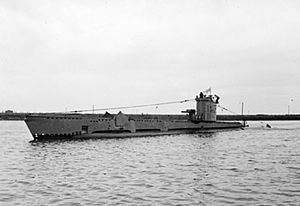Action of 9 February 1945
| Action of 9 February 1945 | |||||||
|---|---|---|---|---|---|---|---|
| Part of Second World War, Battle of the Atlantic | |||||||
 HMS Venturer in August 1943 |
|||||||
|
|||||||
| Belligerents | |||||||
|
|
|||||||
| Commanders and leaders | |||||||
|
|
|
||||||
| Strength | |||||||
| V-class submarine HMS Venturer | Type IX U-boat, U-864 | ||||||
| Casualties and losses | |||||||
| none | Submarine sunk, All 73 crew killed |
||||||
The Action of 9 February 1945 refers to the sinking of the U-boat U-864 in the North Sea off the Norwegian coast during the Second World War by the Royal Navy submarine HMS Venturer. This action is the first and so far only incident of its kind in history where one submarine has intentionally sunk another submarine in combat while both were at periscope depth.
U-864 was a Type IX U-boat, designed for ocean-going voyages far from home ports with limited re-supply. She was on a long-range, covert mission codenamed Operation Caesar to deliver highly sensitive technology to Germany's wartime ally, the Empire of Japan. This included parts for jet engines and missile guidance systems, and 65 tonnes of mercury. She also carried Tadao Yamoto (a Japanese acoustic torpedo expert) and Toshio Nakai (a Japanese fuel expert). Also included were two Messerschmitt engineers, Rudolf ("Rolf") von Chlingensperg and Riclef Schomerus. On 6 February 1945, U-864 passed through the Fedje area (off the coast of Norway) without being detected. During this voyage a normally quiet engine began making an abnormally loud and rhythmic noise that could be easily detected by any ASW equipment in the area. There were many Allied (primarily British) ships, submarines and aircraft in the area on anti-submarine patrol. U-864's commander, Ralf-Reimar Wolfram, decided to return to the pens at Bergen to repair the engine.
By this stage of the war the German naval code, Enigma, had been broken by the Polish and was being decrypted by a team at Bletchley Park using a device called the Bombe. The German naval command was unaware that the British were reading communications sent to the U-boat fleet and so aware of Operation Caesar. Wanting to avoid giving the Japanese any advantage that might allow them to extend the duration of the war in the Pacific, Royal Navy submarine command dispatched Venturer to intercept and destroy U-864.
...
Wikipedia
